Utility of droplet digital PCR for the detection of vector copy quantity in scientific CAR/TCR T cell merchandise.
Genetically engineered T cells have turn into an essential remedy for B-cell malignancies. Measuring the effectivity of vector integration into the T cell genome is essential for assessing the efficiency and security of those most cancers immunotherapies.A digital droplet polymerase chain response (ddPCR) assay was developed and evaluated for assessing the common variety of lenti- and retroviral vectors built-in into Chimeric Antigen Receptor (CAR) and T Cell Receptor (TCR)-engineered T cells.
- The ddPCR assay constantly measured the focus of an empty vector in answer and the common variety of CAR and TCR vectors built-in into T cell populations.
- There was a linear relationship between the common vector copy quantity per cell measured by ddPCR and the proportion of cells transduced as measured by stream cytometry.
- Related vector copy quantity measurements had been obtained by completely different employees utilizing the ddPCR assay, highlighting the assays reproducibility amongst technicians. Evaluation of contemporary and cryopreserved CAR T and TCR engineered T cells yielded comparable outcomes.
- ddPCR is a sturdy software for correct quantitation of common vector copy quantity in CAR and TCR engineered T cells. The assay can be relevant to different kinds of genetically engineered cells together with Pure Killer cells and hematopoietic stem cells.
Improvement of a PCR-based lateral stream strip assay for the straightforward, fast, and correct detection of pork in meat and meat merchandise.
In recent times, adulteration of meat and meat merchandise has turn into a significant meals security problem. PCR and real-time PCR applied sciences are mainstream strategies used to determine animal-derived elements.
Nonetheless, these applied sciences rely extremely on pricey gear {and professional} technicians; they’re due to this fact tough to make use of in resource-limited settings. On this research, a novel, extremely delicate molecular assay, Pig-PCR-Strip (Pig particular polymerase chain reaction-Lateral stream strip), was developed for fast detection of pig and swine-derived elements.
The assay relies on PCR amplification, hybridization of the PCR product to the probe, adopted by detection utilizing a strip format. Utilizing this format, the PCR product might be detected by the bare eye inside three min, and gives a foundation for the migration of species-specific detection to a point-of-care (POC) microfluidic format.
The Pig-PCR-Strip can detect pork elements at a focus of 0.01% in adulterated meat, and the restrict of detection is as much as 10 fg of goal DNA. The assay was particular to pork and didn’t cross-react with different non-target species. It additionally can be utilized for industrial samples and sophisticated meals samples.
It’s a promising new software for detection of pig-derived meat and might be quickly modified for figuring out different species. It might be extensively used for fixing issues associated to meat high quality assurance, species authentication, and traceability.

genpcr
 CP 80633 |
|
27301 |
BPS Bioscience |
10 mg |
EUR 310 |
|
Description: CP 80633 is a selective inhibitor of PDE4, which does not display significant isozyme selectivity. It also inhibits hydrolysis of cAMP in isolated monocytes, eosinophils, human peripheral blood and T-cells. It has been shown to exhibit anti-inflammatory and bronchodilatory activity in vivo. |
 CP Antibody |
|
E046543 |
EnoGene |
100μg/100μl |
EUR 255 |
|
Description: Available in various conjugation types. |
 CP Antibody |
|
E19-9369-1 |
EnoGene |
50ug/50ul |
EUR 145 |
|
Description: Available in various conjugation types. |
 CP Antibody |
|
E19-9369-2 |
EnoGene |
100ug/100ul |
EUR 225 |
|
Description: Available in various conjugation types. |
 CP Antibody |
|
F50324-0.4ML |
NSJ Bioreagents |
0.4 ml |
EUR 322.15 |
|
|
|
Description: Ceruloplasmin is a metalloprotein that binds most of the copper in plasma and is involved in the peroxidation of Fe(II) transferrin to Fe(III) transferrin. Mutations in this protein cause aceruloplasminemia, which results in iron accumulation and tissue damage, and is associated with diabetes and neurologic abnormalities. |
 CP siRNA |
|
20-abx912716 |
Abbexa |
-
Ask for price
-
Ask for price
|
|
|
|
 CP siRNA |
|
20-abx912717 |
Abbexa |
-
Ask for price
-
Ask for price
|
|
|
|
 CP Antibody |
|
46543 |
SAB |
100ul |
EUR 319 |
 CP Antibody |
|
46543-100ul |
SAB |
100ul |
EUR 302.4 |
 CP Antibody |
|
45875-100ul |
SAB |
100ul |
EUR 302.4 |
 CP Antibody |
|
45875-50ul |
SAB |
50ul |
EUR 224.4 |
 CP-809101 |
|
A3330-10 |
ApexBio |
10 mg |
EUR 138 |
|
|
|
Description: 5-HT2C receptor agonist |
 CP-809101 |
|
A3330-50 |
ApexBio |
50 mg |
EUR 591 |
|
|
|
Description: 5-HT2C receptor agonist |
 CP 471474 |
|
A4435-10 |
ApexBio |
10 mg |
EUR 201 |
|
|
|
Description: Broad spectrum MMP inhibitor |
 CP 471474 |
|
A4435-50 |
ApexBio |
50 mg |
EUR 842 |
|
|
|
Description: Broad spectrum MMP inhibitor |
 CP-724714 |
|
A2412-100 |
ApexBio |
100 mg |
EUR 589 |
|
|
|
Description: HER2 inhibitor,potent and selective |
 CP-724714 |
|
A2412-25 |
ApexBio |
25 mg |
EUR 235 |
|
|
|
Description: HER2 inhibitor,potent and selective |
 CP-724714 |
|
A2412-5 |
ApexBio |
5 mg |
EUR 68 |
|
|
|
Description: HER2 inhibitor,potent and selective |
 CP-724714 |
|
A2412-5.1 |
ApexBio |
10 mM (in 1mL DMSO) |
EUR 74 |
|
|
|
Description: HER2 inhibitor,potent and selective |
 CP 316819 |
|
B5448-10 |
ApexBio |
10 mg |
EUR 298 |
|
|
|
Description: Selective glycogen phosphorylase inhibitor |
 CP 316819 |
|
B5448-50 |
ApexBio |
50 mg |
EUR 1185 |
|
|
|
Description: Selective glycogen phosphorylase inhibitor |
 CP 20961 |
|
B5474-10 |
ApexBio |
10 mg |
EUR 226 |
|
|
|
Description: non-immunogenic adjuvant |
 CP 20961 |
|
B5474-50 |
ApexBio |
50 mg |
EUR 952 |
|
|
|
Description: non-immunogenic adjuvant |
 CP 135807 |
|
B7497-10 |
ApexBio |
10 mg |
EUR 270 |
|
|
|
Description: 5-HT1D receptor agonist |
 CP 135807 |
|
B7497-50 |
ApexBio |
50 mg |
EUR 1096 |
|
|
|
Description: 5-HT1D receptor agonist |
 CP 775146 |
|
B7609-10 |
ApexBio |
10 mg |
EUR 308 |
|
|
|
Description: PPARα agonist |
 CP 775146 |
|
B7609-50 |
ApexBio |
50 mg |
EUR 1234 |
|
|
|
Description: PPARα agonist |
 CP 80633 |
|
B7162-10 |
ApexBio |
10 mg |
EUR 258 |
|
|
|
Description: PDE4 inhibitor |
 CP 80633 |
|
B7162-50 |
ApexBio |
50 mg |
EUR 1019 |
|
|
|
Description: PDE4 inhibitor |
 CP 154526 |
|
B7185-1 |
ApexBio |
1 mg |
EUR 48 |
|
|
|
Description: CRF1 receptor antagonist |
 CP 154526 |
|
B7185-5 |
ApexBio |
5 mg |
EUR 78 |
|
|
|
Description: CRF1 receptor antagonist |
 CP 96345 |
|
B7213-10 |
ApexBio |
10 mg |
EUR 285 |
|
|
|
Description: NK1 receptor antagonist |
 CP 96345 |
|
B7213-50 |
ApexBio |
50 mg |
EUR 1163 |
|
|
|
Description: NK1 receptor antagonist |
 CP-640186 |
|
B3585-10 |
ApexBio |
10 mg |
EUR 156 |
|
|
|
Description: isozyme-nonselective acetyl-CoA carboxylase (ACCase) inhibitor |
 CP-640186 |
|
B3585-2 |
ApexBio |
2 mg |
EUR 64 |
|
|
|
Description: isozyme-nonselective acetyl-CoA carboxylase (ACCase) inhibitor |
 CP-640186 |
|
B3585-5 |
ApexBio |
5 mg |
EUR 96 |
|
|
|
Description: isozyme-nonselective acetyl-CoA carboxylase (ACCase) inhibitor |
 CP-640186 |
|
B3585-50 |
ApexBio |
50 mg |
EUR 616 |
|
|
|
Description: isozyme-nonselective acetyl-CoA carboxylase (ACCase) inhibitor |
Improvement and validation of a fast package for authenticity of murine meat in meat merchandise with a species-specific PCR assay.
Adulteration of meat merchandise with murine meat poses an enormous risk to shopper well being and results in critical disruption in meals markets. Species authentication of murine meat continues to be technically difficult.
We, due to this fact, developed a species-specific PCR package consisting of murine meat DNA extraction, PCR response and figuring out techniques. We designed novel common primers focusing on extremely conserved area on mitochondrial cytochrome b gene (cyt b) from 4 murines (lab rats, lab mice, wild rat and wild mice), in addition to particular primers for meat from 4 extensively consumed animal species, cattle, sheep, duck and donkey.
Concurrently, pasmid inserted particular cyt b fragment was cloned and used as the interior positve management within the package. The package parameters of specificity, sensitivity, stability and validity had been decided utilizing mimic counterfeiting meatball.
The specificity of the DNA detection package was 100% in authentication of the 4 fraudulent meats of cattle, sheep, duck and donkey combined murine meat. The minimal detection restrict of the pattern DNA was 0.1 μg. The package, which had freeze-thawed as much as 20 instances and saved for 1 12 months, additionally was highly effective in detecting an quantity of 0.1 mg in synthetic counterfeited cattle, sheep, duck and donkey meat merchandise.
The murine-species DNA detection package proposed on this research has proved to be a easy, correct and efficient assay, and might be utilized to the identification of murine meat traces in widespread edible meat, to make sure the realisable implementation of meat product market supervision
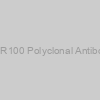 GPR100 Polyclonal Antibody |
|
ABP54815-01ml |
Abbkine |
0.1ml |
EUR 346.8 |
|
|
|
Description: A polyclonal antibody for detection of GPR100 from Human. This GPR100 antibody is for WB, IF, ELISA. It is affinity-purified from rabbit antiserum by affinity-chromatography using epitope-specific immunogenand is unconjugated. The antibody is produced in rabbit by using as an immunogen synthesized peptide derived from the C-terminal region of human GPR100 at AA rangle: 300-380 |
 GPR100 Polyclonal Antibody |
|
ABP54815-02ml |
Abbkine |
0.2ml |
EUR 496.8 |
|
|
|
Description: A polyclonal antibody for detection of GPR100 from Human. This GPR100 antibody is for WB, IF, ELISA. It is affinity-purified from rabbit antiserum by affinity-chromatography using epitope-specific immunogenand is unconjugated. The antibody is produced in rabbit by using as an immunogen synthesized peptide derived from the C-terminal region of human GPR100 at AA rangle: 300-380 |
 GPR100 Polyclonal Antibody |
|
E44H04840 |
EnoGene |
100ul |
EUR 255 |
|
Description: Biotin-Conjugated, FITC-Conjugated , AF350 Conjugated , AF405M-Conjugated ,AF488-Conjugated, AF514-Conjugated ,AF532-Conjugated, AF555-Conjugated ,AF568-Conjugated , HRP-Conjugated, AF405S-Conjugated, AF405L-Conjugated , AF546-Conjugated, AF594-Conjugated , AF610-Conjugated, AF635-Conjugated , AF647-Conjugated , AF680-Conjugated , AF700-Conjugated , AF750-Conjugated , AF790-Conjugated , APC-Conjugated , PE-Conjugated , Cy3-Conjugated , Cy5-Conjugated , Cy5.5-Conjugated , Cy7-Conjugated Antibody |
 GPR100 Rabbit Polyclonal Antibody |
|
ES5814-100ul |
ELK Biotech |
100ul |
EUR 124 |
|
|
|
Description: A Rabbit Polyclonal antibody against GPR100 from Human. This antibody is tested and validated for WB, ELISA, IF, WB, ELISA |
 GPR100 Rabbit Polyclonal Antibody |
|
ES5814-50ul |
ELK Biotech |
50ul |
EUR 74 |
|
|
|
Description: A Rabbit Polyclonal antibody against GPR100 from Human. This antibody is tested and validated for WB, ELISA, IF, WB, ELISA |
 Antibody) G-Protein Coupled Receptor 100 (GPR100) Antibody |
|
20-abx015249 |
Abbexa |
-
Ask for price
-
Ask for price
-
Ask for price
-
Ask for price
|
- 100 ug
- 10 ug
- 200 ug
- 300 µg
|
|
|
 Antibody) G-Protein Coupled Receptor 100 (GPR100) Antibody |
|
abx015249-100g |
Abbexa |
100 µg |
EUR 43.75 |
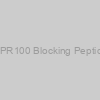 GPR100 Blocking Peptide |
|
DF4888-BP |
Affbiotech |
1mg |
EUR 234 |
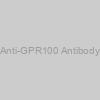 Anti-GPR100 Antibody |
|
A09371 |
BosterBio |
100ul |
EUR 476.4 |
|
Description: Rabbit Polyclonal Antibody for GPR100 Antibody (RXFP4) detection.tested for WB in Human. |
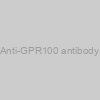 Anti-GPR100 antibody |
|
STJ93312 |
St John's Laboratory |
200 µl |
EUR 236.4 |
|
Description: Rabbit polyclonal to GPR100. |
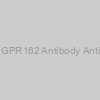 Anti- GPR162 Antibody Antibody |
|
GWB-39B7E0 |
GenWay Biotech |
0.05 ml |
Ask for price |
|
|
 Anti- GPR162 Antibody Antibody |
|
GWB-AAD3BE |
GenWay Biotech |
0.05 ml |
Ask for price |
 Anti- GPR162 Antibody Antibody |
|
GWB-C5010A |
GenWay Biotech |
0.05 ml |
Ask for price |
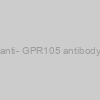 anti- GPR105 antibody |
|
FNab03588 |
FN Test |
100µg |
EUR 658.5 |
|
|
|
Description: Antibody raised against GPR105 |
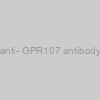 anti- GPR107 antibody |
|
FNab03589 |
FN Test |
100µg |
EUR 702 |
|
|
|
Description: Antibody raised against GPR107 |
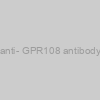 anti- GPR108 antibody |
|
FNab03590 |
FN Test |
100µg |
EUR 658.5 |
|
|
|
Description: Antibody raised against GPR108 |
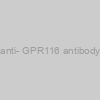 anti- GPR116 antibody |
|
FNab03591 |
FN Test |
100µg |
EUR 658.5 |
|
|
|
Description: Antibody raised against GPR116 |
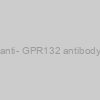 anti- GPR132 antibody |
|
FNab03593 |
FN Test |
100µg |
EUR 606.3 |
|
|
|
Description: Antibody raised against GPR132 |
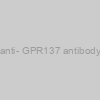 anti- GPR137 antibody |
|
FNab03594 |
FN Test |
100µg |
EUR 606.3 |
|
|
|
Description: Antibody raised against GPR137 |
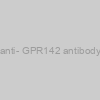 anti- GPR142 antibody |
|
FNab03597 |
FN Test |
100µg |
EUR 702 |
|
|
|
Description: Antibody raised against GPR142 |
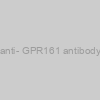 anti- GPR161 antibody |
|
FNab03598 |
FN Test |
100µg |
EUR 606.3 |
|
|
|
Description: Antibody raised against GPR161 |
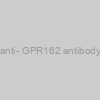 anti- GPR162 antibody |
|
FNab03599 |
FN Test |
100µg |
EUR 702 |
|
|
|
Description: Antibody raised against GPR162 |
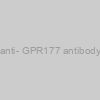 anti- GPR177 antibody |
|
FNab03601 |
FN Test |
100µg |
EUR 658.5 |
|
|
|
Description: Antibody raised against GPR177 |
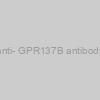 anti- GPR137B antibody |
|
FNab03595 |
FN Test |
100µg |
EUR 702 |
|
|
|
Description: Antibody raised against GPR137B |
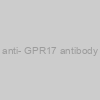 anti- GPR17 antibody |
|
FNab03600 |
FN Test |
100µg |
EUR 658.5 |
|
|
|
Description: Antibody raised against GPR17 |
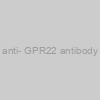 anti- GPR22 antibody |
|
FNab03603 |
FN Test |
100µg |
EUR 606.3 |
|
|
|
Description: Antibody raised against GPR22 |
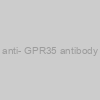 anti- GPR35 antibody |
|
FNab03605 |
FN Test |
100µg |
EUR 702 |
|
|
|
Description: Antibody raised against GPR35 |
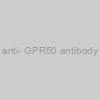 anti- GPR50 antibody |
|
FNab03607 |
FN Test |
100µg |
EUR 658.5 |
|
|
|
Description: Antibody raised against GPR50 |
 anti- GPR50 antibody |
|
FNab03608 |
FN Test |
100µg |
EUR 658.5 |
|
|
|
Description: Antibody raised against GPR50 |
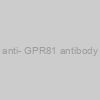 anti- GPR81 antibody |
|
FNab03610 |
FN Test |
100µg |
EUR 702 |
|
|
|
Description: Antibody raised against GPR81 |
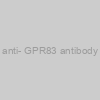 anti- GPR83 antibody |
|
FNab03611 |
FN Test |
100µg |
EUR 702 |
|
|
|
Description: Antibody raised against GPR83 |
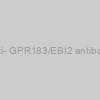 anti- GPR183/EBI2 antibody |
|
FNab03602 |
FN Test |
100µg |
EUR 658.5 |
|
|
|
Description: Antibody raised against GPR183/EBI2 |
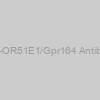 Anti-OR51E1/Gpr164 Antibody |
|
A30874 |
BosterBio |
100ul |
EUR 476.4 |
|
Description: Rabbit Polyclonal OR51E1/Gpr164 Antibody. Validated in IF, WB and tested in Human. |
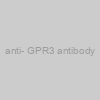 anti- GPR3 antibody |
|
FNab03604 |
FN Test |
100µg |
EUR 702 |
|
|
|
Description: Antibody raised against GPR3 |
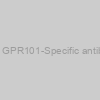 anti- GPR101-Specific antibody |
|
FNab03587 |
FN Test |
100µg |
EUR 702 |
|
|
|
Description: Antibody raised against GPR101-Specific |
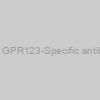 anti- GPR123-Specific antibody |
|
FNab03592 |
FN Test |
100µg |
EUR 702 |
|
|
|
Description: Antibody raised against GPR123-Specific |
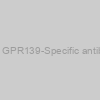 anti- GPR139-Specific antibody |
|
FNab03596 |
FN Test |
100µg |
EUR 606.3 |
|
|
|
Description: Antibody raised against GPR139-Specific |
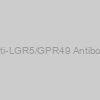 Anti-LGR5/GPR49 Antibody |
|
ER1902-52 |
HUABIO |
100ul |
EUR 189 |
|
|
|
Description: G protein-coupled receptors (GPCRs), also designated seven transmembrane (7TM) receptors or heptahelical receptors, interact with G proteins (heterotrimeric GTPases) to synthesize intracellular second messengers, such as diacylglycerol, cyclic AMP, inositol phosphates and calcium ions. Their diverse biological functions range from vision and olfaction to neuronal and endocrine signaling and are involved in many pathological conditions. LGR5 (leucine-rich repeat-containing G-protein coupled receptor 5), also known as GPR49 or GPR67, is a 907 amino acid multi-pass membrane protein that contains 17 leucine-rich repeats and belongs to the G protein-coupled receptor family. Expressed in placenta, skeletal muscle and spinal cord, LGR5 functions as an orphan receptor that is thought to play an important role in embryonic growth control and cellular differentiation. Overexpression of LGR5 is associated with increased tumor susceptibility and malignant transformation, implicating LGR5 as a potent tumor-inducing protein. |
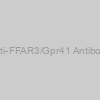 Anti-FFAR3/Gpr41 Antibody |
|
A02437 |
BosterBio |
100ul |
EUR 476.4 |
|
Description: Rabbit Polyclonal FFAR3/Gpr41 Antibody. Validated in IF and tested in Human, Mouse. |
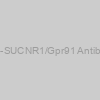 Anti-SUCNR1/Gpr91 Antibody |
|
A08485 |
BosterBio |
100ul |
EUR 476.4 |
|
Description: Rabbit Polyclonal SUCNR1/Gpr91 Antibody. Validated in WB and tested in Human, Mouse, Rat. |
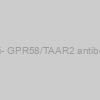 anti- GPR58/TAAR2 antibody |
|
FNab03609 |
FN Test |
100µg |
EUR 658.5 |
|
|
|
Description: Antibody raised against GPR58/TAAR2 |
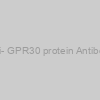 Anti- GPR30 protein Antibody |
|
GWB-234F28 |
GenWay Biotech |
0.05 ml |
Ask for price |
|
|
 Anti- GPR30 protein Antibody |
|
GWB-55A4AD |
GenWay Biotech |
0.05 ml |
Ask for price |
|
|
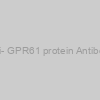 Anti- GPR61 protein Antibody |
|
GWB-59F0BF |
GenWay Biotech |
0.05 ml |
Ask for price |
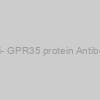 Anti- GPR35 protein Antibody |
|
GWB-3B0BBC |
GenWay Biotech |
0.05 ml |
Ask for price |
|
|
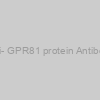 Anti- GPR81 protein Antibody |
|
GWB-1AE0F9 |
GenWay Biotech |
0.05 ml |
Ask for price |
|
|
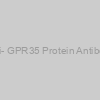 Anti- GPR35 Protein Antibody |
|
GWB-A464DB |
GenWay Biotech |
0.05 ml |
Ask for price |
 Anti- GPR35 Protein Antibody |
|
GWB-AE2190 |
GenWay Biotech |
0.05 ml |
Ask for price |
 Anti- GPR30 protein Antibody |
|
GWB-A0122E |
GenWay Biotech |
0.05 ml |
Ask for price |
 Anti- GPR61 protein Antibody |
|
GWB-3499A3 |
GenWay Biotech |
0.05 ml |
Ask for price |
|
|
 Anti- GPR30 protein Antibody |
|
GWB-DE3DB6 |
GenWay Biotech |
0.05 ml |
Ask for price |
 Anti- GPR30 protein Antibody |
|
GWB-EB0571 |
GenWay Biotech |
0.05 ml |
Ask for price |
 Anti- GPR35 Protein Antibody |
|
GWB-6F74EA |
GenWay Biotech |
0.05 ml |
Ask for price |
 Anti- GPR30 protein Antibody |
|
GWB-CD9A41 |
GenWay Biotech |
0.05 ml |
Ask for price |
 Anti- GPR81 protein Antibody |
|
GWB-D1307B |
GenWay Biotech |
0.05 ml |
Ask for price |
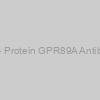 Anti- Protein GPR89A Antibody |
|
GWB-5089F1 |
GenWay Biotech |
0.05 ml |
Ask for price |
|
|
 Anti- Protein GPR89A Antibody |
|
GWB-3FB98B |
GenWay Biotech |
0.05 ml |
Ask for price |
|
|
 Anti- Protein GPR89A Antibody |
|
GWB-F75F70 |
GenWay Biotech |
0.05 ml |
Ask for price |
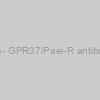 anti- GPR37/Pael-R antibody |
|
FNab03606 |
FN Test |
100µg |
EUR 606.3 |
|
|
|
Description: Antibody raised against GPR37/Pael-R |
 Antibody) Anti- G-Protein Receptor (GPR175) Antibody |
|
GWB-234A5C |
GenWay Biotech |
0.05 mg |
Ask for price |
|
|
 Antibody) Anti- G-protein Receptor (GPR171) Antibody |
|
GWB-11ED0D |
GenWay Biotech |
0.05 mg |
Ask for price |
|
|
 Antibody) Anti- PAEL Receptor (GPR37) Antibody |
|
GWB-518459 |
GenWay Biotech |
0.05 mg |
Ask for price |
|
|
 Antibody) Anti- G-Protein Receptor (GPR21) Antibody |
|
GWB-541858 |
GenWay Biotech |
0.05 mg |
Ask for price |
|
|
 Antibody) Anti- G-Protein Receptor (GPR44) Antibody |
|
GWB-5B6C96 |
GenWay Biotech |
0.05 mg |
Ask for price |
 Antibody) Anti- G-Protein Receptor (GPR61) Antibody |
|
GWB-62F59C |
GenWay Biotech |
0.05 mg |
Ask for price |
 Antibody) Anti- G-Protein Receptor (GPR20) Antibody |
|
GWB-EAADC4 |
GenWay Biotech |
0.05 mg |
Ask for price |
 Antibody) Anti- G-Protein Receptor (GPR22) Antibody |
|
GWB-6A6B9A |
GenWay Biotech |
0.05 mg |
Ask for price |
 Antibody) Anti- G-Protein Receptor (GPR15) Antibody |
|
GWB-720C16 |
GenWay Biotech |
0.05 mg |
Ask for price |
 Antibody) Anti- G-Protein Receptor (GPR32) Antibody |
|
GWB-74345C |
GenWay Biotech |
0.05 mg |
Ask for price |
 Antibody) Anti- G-protein Receptor (GPR21) Antibody |
|
GWB-CB3838 |
GenWay Biotech |
0.05 mg |
Ask for price |
 Antibody) Anti- G-Protein Receptor (GPR20) Antibody |
|
GWB-CC4E26 |
GenWay Biotech |
0.05 mg |
Ask for price |
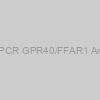 Anti-GPCR GPR40/FFAR1 Antibody |
|
A01349-2 |
BosterBio |
100ug/vial |
EUR 352.8 |
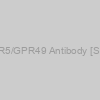 Anti-LGR5/GPR49 Antibody [SU32-04] |
|
ET1608-18 |
HUABIO |
100ul |
EUR 231 |
|
|
|
Description: Leucine-rich repeat-containing G-protein coupled receptor 5 (LGR5) also known as G-protein coupled receptor 49 (GPR49) or G-protein coupled receptor 67 (GPR67) is a protein that in humans is encoded by the LGR5 gene. It is a member of GPCR class A receptor proteins. R-spondin proteins are the biological ligands of LGR5. LGR5 is expressed across a diverse range of tissue such as in the muscle, placenta, spinal cord and brain and particularly as a biomarker of adult stem cells in certain tissues. LGR5 is a member of the Wnt signaling pathway. Although its ligand remains elusive, it has been shown that costimulation with R-spondin 1 and Wnt-3a induce increased internalization of LGR5. LGR5 also cointernalizes with LRP6 and FZD5 via a clathrin-dependent pathway to form a ternary complex upon Wnt ligand binding. Moreover, the rapid cointernalization of LRP6 by LGR5 induces faster rates of degradation for the former. LGR5 is crucial during embryogenesis as LGR null studies in mice incurred 100% neonatal mortality accompanied by several craniofacial distortions such as ankyloglossia and gastrointestinal dilation. |
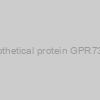 Anti- Hypothetical protein GPR73 Antibody |
|
GWB-AD8D6F |
GenWay Biotech |
0.05 ml |
Ask for price |





Leave a Reply